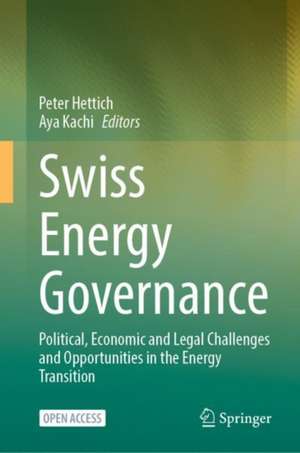Swiss Energy Governance: Political, Economic and Legal Challenges and Opportunities in the Energy Transition
Editat de Peter Hettich, Aya Kachien Limba Engleză Paperback – 27 noi 2021
| Toate formatele și edițiile | Preț | Express |
|---|---|---|
| Paperback (1) | 307.93 lei 38-44 zile | |
| Springer International Publishing – 27 noi 2021 | 307.93 lei 38-44 zile | |
| Hardback (1) | 435.59 lei 3-5 săpt. | |
| Springer International Publishing – 27 noi 2021 | 435.59 lei 3-5 săpt. |
Preț: 307.93 lei
Nou
Puncte Express: 462
Preț estimativ în valută:
58.93€ • 63.99$ • 49.50£
58.93€ • 63.99$ • 49.50£
Carte tipărită la comandă
Livrare economică 18-24 aprilie
Preluare comenzi: 021 569.72.76
Specificații
ISBN-13: 9783030807894
ISBN-10: 3030807894
Pagini: 400
Ilustrații: XII, 400 p. 33 illus., 12 illus. in color.
Dimensiuni: 155 x 235 mm
Greutate: 0.58 kg
Ediția:1st ed. 2022
Editura: Springer International Publishing
Colecția Springer
Locul publicării:Cham, Switzerland
ISBN-10: 3030807894
Pagini: 400
Ilustrații: XII, 400 p. 33 illus., 12 illus. in color.
Dimensiuni: 155 x 235 mm
Greutate: 0.58 kg
Ediția:1st ed. 2022
Editura: Springer International Publishing
Colecția Springer
Locul publicării:Cham, Switzerland
Cuprins
Peter Hettich and Aya Kachi, Introduction.- Part I Interactions Between Swiss and European Energy Systems and Policy: Julia Hänni and Tienmu Ma, Swiss Climate Change Law.- Sebastian Heselhaus, The Quest for the Future Energy Mix in the EU and in Switzerland.- Benjamin Hofmann, David Kolcava and Philipp Thaler, The Role of Switzerland in European Electricity Governance.- Leonore Haelg, Tobias S. Schmidt and Sebastian Sewerin, The Design of the Swiss Feed-In Tariff.- Part II: Actors Driving the Energy Transition: Martin Föhse, Decentralisation of Energy Generation, Centralisation of Energy Lawmaking.- Raphael Klein and Matthias Finger, The Long-Term Impact of the Electorate on the Swiss Electricity Market Transition.- Peter Hettich, Governing Decentral Energy Systems.- Markus Schreiber, Governance of Energy Innovations.- Mary Jean Bürer, Matthieu de Lapparent, Massimiliano Capezzali and Mauro Carpita, Governance Drivers and Barriers for Business Model Transformation inthe Energy Sector.- Andreas Abegg and Phil Baumann, Electricity Utility Companies Entering Private Sector Markets.- Part III: Understanding the Pressure Points of Policy and Acceptance Risks: Adrian Rinscheid and Linards Udris, Referendum Campaigns in Swiss Energy Policy.- Lena Schaffer and Alessio Levis, Public Discourses on (Sectoral) Energy Policy in Switzerland.- Anna Ebers Broughel and Rolf Wüstenhagen, The Influence of Policy Risk on Swiss Wind Power Investment.- Mert Duygan, Aya Kachi, Fintan Oeri, Thiago D. Oliveira and Adrian Rinscheid, Energy Policymaking in Switzerland.- Part IV: Concluding Remarks: Aya Kachi and Peter Hettich, Conclusions and Policy Implications.
Notă biografică
Peter Hettich is a Professor of Economic Regulation and Antitrust Law at the Law School of the University of St. Gallen (Switzerland). His research focuses on risk regulation, infrastructure law (energy, telecommunications, postal services, internet, media), state owned enterprises, spatial planning law, as well as environmental law. He holds a Ph.D. in Antitrust Law from the University of St. Gallen and a LL.M. of the Columbia University School of Law (New York). From 2017 to 2021, he was a co-leader of the Energy Governance Work Package in the the Swiss Competence Centers for Energy Research, Society and Transition (SCCER CREST).Aya Kachi is Associate Professor of international Political Economy and Energy Policy at the Faculty of Business and Economics, the University of Basel. Her areas of expertise include statistical methodology, international political economy, and policy communication. Her research seeks to help people understand policy acceptance risks, focusing on opinion-formation and decision-making by voters and special interest groups. She holds a Ph.D. in Political Science from the University of Illinois, Urbana-Champaign, M.A. in Economics from Duke University, and B.A. in Economics from the University of Tokyo. From 2017 to 2021, she served as a co-leader of the Energy Governance Work Package in the the Swiss Competence Centers for Energy Research, Society and Transition (SCCER CREST).
Textul de pe ultima copertă
This open access book gathers the results of an interdisciplinary research project led by the Swiss Competence Centers for Energy Research (SCCER CREST) and jointly implemented by several universities. It identifies political, economic and legal challenges and opportunities in the energy transition from a governance perspective by exploring a variety of tools that allow state, non-state and transnational actors to manage the transition of the energy industry toward less fossil-fuel reliance. When analyzing the roles of these actors, the authors examine not only formal procedures such as political and democratic processes, but also market behavior and societal practices. In other words, the handbook focuses on both the behavior and the positive and normative frameworks of political actors, bureaucracies, courts, international organizations, lobby groups, civil society, economic actors and individuals. The authors subsequently use their findings to formulate specific guidelines for lawmakers and other rule-makers, as well as private and public actors. To do so, they draw on approaches stemming from the legal, political and management sciences.
Caracteristici
Provides readers with an integrated legal, political and economic perspective Includes guidelines for state and non-state actors to manage the energy transition in CH and other European countries Integrates the results of an interdisciplinary research project of the Swiss Competence Centers for Energy Research This book is open access, which means that you have free and unlimited access
